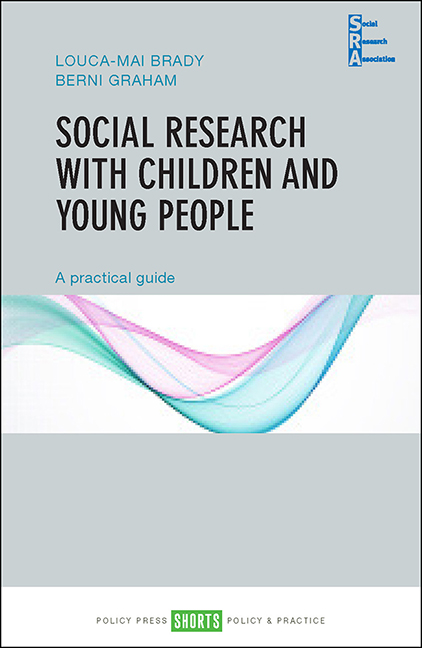Book contents
- Frontmatter
- Contents
- List of illustrations
- Notes on authors
- 1 Introduction
- 2 The context for social research with children and young people
- 3 Involving children and young people in research
- 4 Ethical considerations
- 5 Designing appropriate methods for children and young people
- 6 Conclusions
- Bibliography
- Index
- Social Research Association Shorts
4 - Ethical considerations
Published online by Cambridge University Press: 13 April 2022
- Frontmatter
- Contents
- List of illustrations
- Notes on authors
- 1 Introduction
- 2 The context for social research with children and young people
- 3 Involving children and young people in research
- 4 Ethical considerations
- 5 Designing appropriate methods for children and young people
- 6 Conclusions
- Bibliography
- Index
- Social Research Association Shorts
Summary
Introduction
This chapter outlines the key ethical values and principles to consider when undertaking social research or evaluation with children and young people and the practical aspects around their application. Rather than repeating general ethical guidance which applies to all social research, we focus on the additional issues pertaining to children and young people, whether this is as research subjects, peer researchers or co-producers. Ethical considerations are more pronounced when working with children and young people, partly because of their relative vulnerability and lack of familiarity with research compared to adults. However, proportionality is important: the ethical issues connected to a short survey differ substantially from those involving in-depth exploration of sensitive data, and not all aspects apply to every study. Moreover, it is important that ethical considerations are not used as an excuse to not work with this group. Good planning and attention to detail are often all that is needed. This chapter covers:
• general ethical foundations and
• additional ethical dimensions and considerations around
– avoiding harm and providing benefit
– informed consent
– protecting confidentiality, anonymity and privacy, and
– minimising bias
General ethical foundations
Many excellent references and guidance already exist and most explore the philosophical and pragmatic underpinnings of good ethics in social research (see the references section in this chapter and the Bibliography). Applicable to any study with all ages, these tend to agree on a key set of researcher behaviour and characteristics, such as integrity, having the required professional expertise, honesty, openness, reflexivity and treating others fairly; and key principles, including informed consent, preventing harm, creating benefit, using appropriate methods and protecting confidentiality, privacy and anonymity. Examples and summaries of the main points are set out in Box 4.1.
All emphasise that acting ‘ethically’ involves much more than following a list of do-s and don’ts. In real life research circumstances, ethical principles can sometimes be in tension with each other and it is up to the researcher to balance these conflicts. In other words, guidance alone is never enough and ‘cannot replace the need for self-critical, imaginative and responsible ethical reflection about issues which may arise in the course of research, but it can help guide and illustrate how to proceed’.
- Type
- Chapter
- Information
- Social Research with Children and Young PeopleA Practical Guide, pp. 59 - 100Publisher: Bristol University PressPrint publication year: 2018

